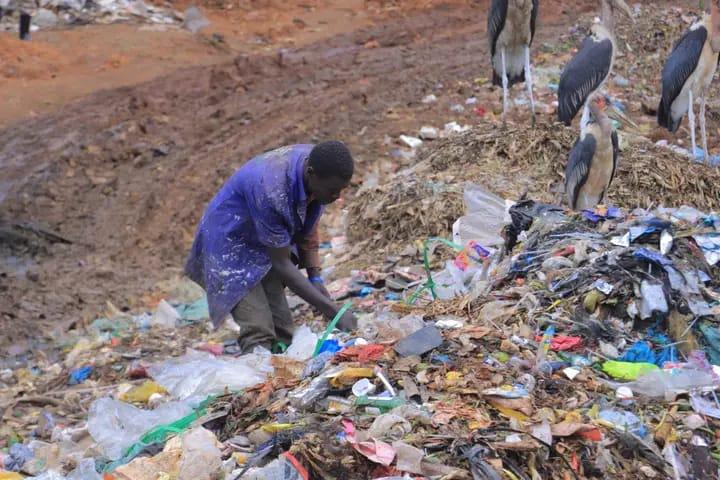
What the UN plastic treaty means to a garbage collector in Kisii amid global push to end pollution » Capital News
KISII, Kenya, Aug 5 – At dawn, before Kisii town stirs to life, Brian Makori a street boy used to bend over heaps of garbage at Nyambera dumping site on the outskirts of Kisii town, with bear hands sifting through plastic bottles, wrappers and discarded packaging and sale at to brokers for recycling.
Brian grew up in this environment while trading plastic waste to make a living, here he was surrounded with genuine friends, they lived love and laughed in the middle of smoke, fetid tonnes of garbage, a place he called home.
The 19 year-old boy moved to the streets after his parents passed and left him with his siblings, he had no one to take care of him and he decided to move to the streets to make a living, at the age of twelve his life changed and he became a street boy ‘Chokora’.
“for the past six years I have lived on the streets, my life has revolved in picking waste from dumping sites and selling it to brokers in order to buy food,” says Brian.
He says it’s challenging since they are constantly exposed to harmful substances from burning of plastics, medical wastes and toxic fumes, they often suffer from cuts from sharp objects and risk contracting infections.
As diplomats converge in Geneva for a roundtable to seal a global plastic pact, millions of waste collectors like Brian in Kisii face the consequences of plastic pollution and hope their voices are not left out
Breathing new life, restoring a dumping site into a safe ,Governor’s park
For years, air at Nyambera dumping site was thick with stench of rot and smoke, today a place that was once filled with heaps of garbage has blossomed into a thriving green park filled with trees ,walking paths with gardens.
Kisii governor Simba Arati restored this dumping site to a green park in response to the growing plastic pollution crisis by turning the waste into an opportunity.
Governor Arati says he relocated the dumping site from town for easy management in sorting the waste. The plastic recycle and reuse initiative empowers the locals who collect, sort and reuse plastic waste into useful products such as reusable packaging.
“our efforts not only reduced environmental harm from plastic pollution, it created jobs for hundreds of youth and women. Through training and creating awareness, creating a recycling hub at our Kisii Agricultural Training Center promotes a circular economy for our people,” says Arati .
The Governor’s initiative of giving plastic a second chance stands on the pillar of reducing reuse and recycling, giving a second life to plastic and promoting a circular economy in the region.
“turning trash into useful products is not only cleaning our county but also building a future where sustainability and dignity are valued,” says Arati
Kenya’s Bold Ban Still Holds, Eight Years On
Seven years ago, Kenya banned the single use of plastic bags, an approach to fighting plastic pollution. This ban has led to a notable improvement on doing away with plastic pollution.
Also the 2024 directive on biodegradable liners is a major achievement towards a waste-management framework whose impact will depend on consistency and enforcement.
The ban of the single use plastic bag has led to major improvement as many Kenyans switched to reusable bags alternatives.
Many East Africa Community (EAC) member states already introduced their own bans at national levels before the regional bill. Kenya banned use of plastic bags in 2017 and single –use plastic in protected areas in 2020 while Tanzania enacted a plastic bag ban in 2019.Rwanda banned plastic bags back in 2008 and Uganda attempted a ban in 2009 with weak enforcement.
According to the UNTCAD report which was produced as part of the Sustainable Manufacturing and Environmental Pollution(SMEP) programme, worldwide trade in plastic substitutes and their products was worth$388 in 2020.
Sealing of UN plastic treaty in Geneva
The UN Global Plastic Treaty has kicked off in Geneva, Switzerland. If sealed, it will the world’s first binding agreement to tackle plastic waste on reduce ,reuse and recycle
Countries like Kenya have much hope for this treaty to be a turning point for plastic waste management since it already banned the single use of plastic bags. The question remains whether enough countries are going to support binding production reduction on plastic and a just transition for developing countries and limit toxic chemicals.
United Nations Trade and Development (UNCTAD) and Sustainable Manufacturing and Environmental Pollution Programme (SMEP)lead Henrique Pacini says, the top-down approach on global negotiations countries come together to create an international legally binding agreement on plastic pollution.
“The lifecycle approach Covers the full lifecycle of plastics, from production to disposal and recycling with a key focus in plastic production limits, waste management, micro-plastics alternative and non-plastic substitute materials stakeholder engagement and implementation and compliance ,” says Henrique
The regional processes such as the EALA Single-Use Plastics Bill aims to ban and regulate plastic products across East Africa Community(EAC) member states. The European Union(EU) Single-Use Plastics Directive restricts certain plastic products and promotes extended producer responsibility.
The Pacific Regional Action Plan on Marine Litter focuses on reducing plastic pollution, especially in the ocean and the ASEAN Regional Action Plan. for Combating Marine Debris (2021–2025) supports waste management and circular economy initiatives to help countries protect shared environments.